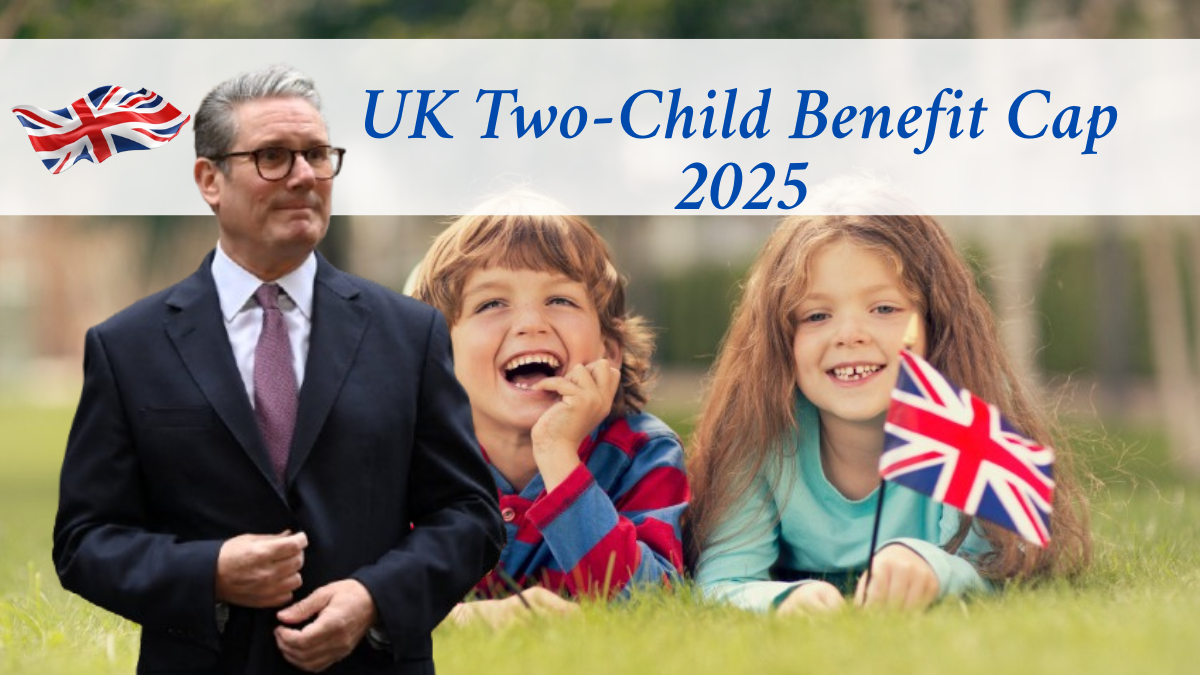As of May 2025, the UK Government’s two-child benefit cap remains in place and continues to spark national debate. Introduced in April 2017, the policy limits financial support through Universal Credit and Child Tax Credit for third and subsequent children born after April 6, 2017. While designed to promote fiscal responsibility, the cap has become a focal point in discussions around child poverty, welfare reform, and economic inequality.

Summary Table: UK Two-Child Benefit Cap 2025
| Detail | Information |
|---|---|
| Policy Start Date | April 6, 2017 |
| Children Affected | 1.6 million (2025 estimate) |
| Households Affected | Over 450,000 |
| Who Is Affected | Families on Universal Credit or Child Tax Credit |
| Weekly Child Benefit (2025) | £26.05 (eldest), £17.25 (additional children) |
| Estimated Repeal Cost | £2.5B (2025); £3.6B (full rollout) |
| Most Affected Regions | London, North West, West Midlands |
| Official Site | www.gov.uk/child-benefit |
Understanding the Two-Child Benefit Cap
The two-child limit restricts additional child-related support from Universal Credit and Child Tax Credit to the first two children in a household, if born after April 6, 2017. Affected families receive no extra financial support for third or subsequent children unless they meet specific exemption criteria.
The Cap Applies To:
- Families on Universal Credit
- Families claiming Child Tax Credit
- Children born on or after April 6, 2017
Who Is Most Affected?
According to recent data:
- 59% of affected households are in work
- Annual losses per additional child can reach up to £3,455
- Urban regions like London and the West Midlands report the highest concentration of impacted families
This policy disproportionately affects low-income, working families struggling with rising living costs, especially in areas with high housing demand.
Current Exemptions to the Two-Child Cap
Several scenarios qualify families to claim additional support beyond the two-child limit:
- Multiple Births: Twins or triplets born after a second child still qualify
- Adoption or Kinship Care: Children adopted or cared for by relatives may be exempt
- Non-Consensual Conception: Applies in cases of rape or coercion, with supporting documentation
Families meeting exemption conditions must report their situation through their benefit portal or contact the DWP directly.
2025 Child Benefit Rates (Separate from the Cap)
Despite the two-child limit, standard Child Benefit continues for all eligible children:
- £26.05/week for the eldest or only child
- £17.25/week for each subsequent child
These payments are universal and unaffected by the cap, though high-income earners may face a reduction through the High-Income Child Benefit Charge.
Policy Debate: Fiscal Responsibility vs. Social Fairness
Supporters argue that the cap encourages responsible family planning and reduces long-term reliance on state aid.
Critics highlight that:
- Many families affected were not on benefits when their children were born
- Life events such as divorce, illness, or job loss can unexpectedly push families into hardship
- The policy disproportionately affects children in working households
Possible Reforms in 2025
Although a full repeal is unlikely due to its projected £3.6 billion cost, growing political pressure has led to active policy reviews. Proposals include:
- Exemptions for children under five
- Enhanced benefits for disabled children
- Inflation-linked child benefit increases
- Expanded childcare support for working families
- New early childhood payments (ages 0–3)
These reforms aim to soften the policy’s harshest impacts without dismantling it entirely.
Understanding the Benefit Cap vs. the Two-Child Limit
These two policies are often confused. Here’s the distinction:
| Policy | Description |
| Two-Child Cap | Limits support for third+ children under UC/CTC |
| Benefit Cap | Puts a ceiling on total household benefits |
Current Benefit Cap Rates:
- London Couples: £25,323/year
- London Single Parents: £16,967/year
- Outside London Couples: £22,020/year
- Outside London Single Parents: £14,753/year
Families with large households can be affected by both policies simultaneously.
What Affected Families Should Do
If you’re impacted by the two-child cap, consider these steps:
- Use Benefit Calculators: Sites like Turn2Us and EntitledTo help estimate entitlements
- Seek Guidance: Citizens Advice and CPAG offer detailed advice on exemptions and appeals
- Review Your Claim: Reassess your eligibility if life circumstances have changed
- Track Policy Updates: Stay informed via GOV.UK and trusted charities
Looking Ahead
The two-child benefit cap continues to shape the lives of millions. In 2025, its future hinges on a balance between economic constraints and growing demand for more equitable support policies.
Even without full repeal, targeted reforms could alleviate the burden on vulnerable families—especially those working full-time yet still struggling to make ends meet.
FAQs on the 2025 Two-Child Benefit Cap
Q: Who qualifies for an exemption?
A: Multiple births, adoption, kinship care, or non-consensual conception may qualify.
Q: Does the cap affect all types of benefits?
A: No. It only applies to Universal Credit and Child Tax Credit. Standard Child Benefit is unaffected.
Q: Is a full repeal expected in 2025?
A: Not likely due to financial costs, but targeted reforms are under review.
Q: What resources can help me assess eligibility?
A: Use Turn2Us, EntitledTo, or speak with Citizens Advice or CPAG.
Q: How can I stay informed on policy changes?
A: Follow updates from GOV.UK, DWP, CPAG, and major UK news sources.
For official updates and guidance, visit: www.gov.uk/child-benefit
Click Here To Know More